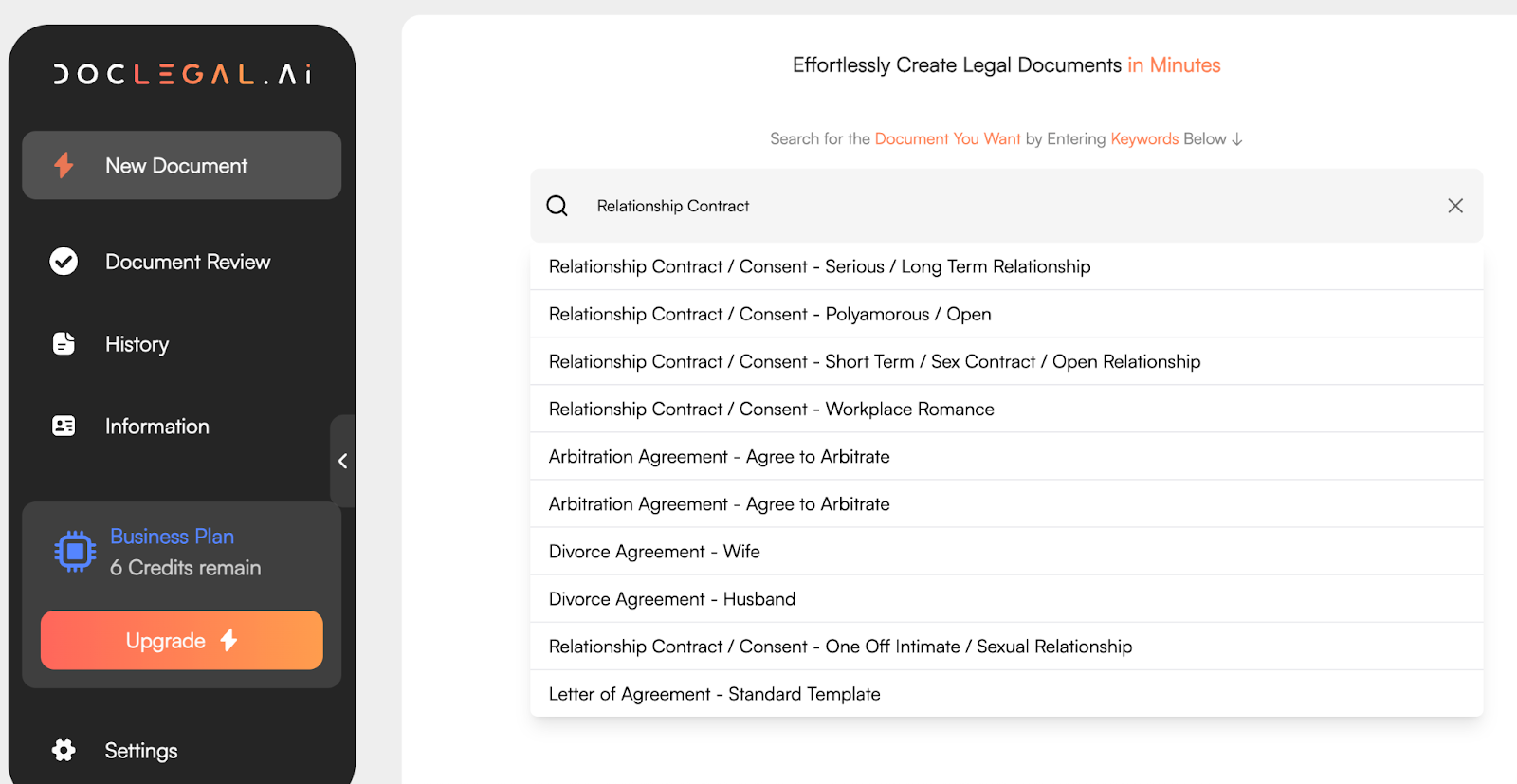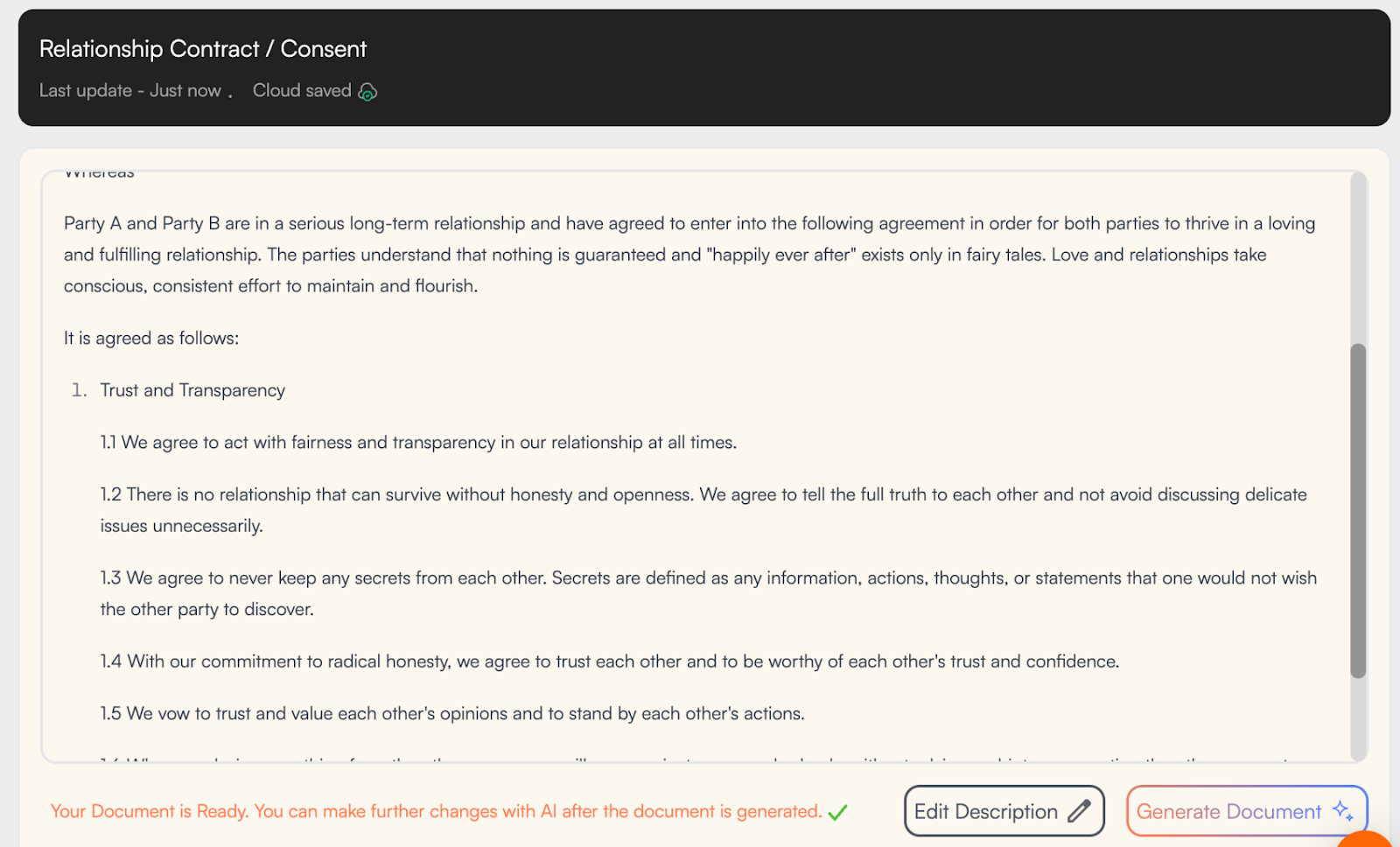______________________________________________________________________
Key Takeaways
- Relationship contracts clarify expectations in emotional, financial, and practical aspects of modern relationships
- Having a written relationship contract can foster mutual respect and set expectations from the relationship at the outset.
- Financial terms agreed by the parties in the relationship agreement can be legally binding and enforceable in certain circumstances.
- Emotional or behavioural promises in the relationship agreement are not enforceable.
______________________________________________________________________
What Is a Relationship Contract?
A relationship contract is a written agreement between two people in an intimate or committed relationship. It records mutual expectations about how the relationship will work day to day emotionally, practically, and sometimes financially.
While some couples treat it as a symbolic exercise, others create detailed agreements covering matters such as:
- Finances: How expenses will be shared or savings managed.
- Communication: Expectations for openness, boundaries, and privacy.
- Conflict resolution: How disagreements will be handled.
- Domestic life: Living arrangements, chores, and family planning.
- Digital behaviour: Guidelines for social media, texting, and online privacy.
The act of drafting the contract itself often matters more than the document that results. It forces honest conversation about topics that are easy to avoid such as money, time, personal space, and values.
Are Relationship Contracts Legally Enforceable?
Not Really. The closer a relationship contract resembles a cohabitation or financial agreement, the more likely it is to hold legal weight. Emotional or behavioural promises, however, remain symbolic.
Relationship Contracts in the US
Casual "relationship contracts" are generally not legally enforceable in the US, as they often contain non-financial provisions and lack the legal requirements of a binding contract. However, legally enforceable agreements like cohabitation agreements (for unmarried couples) and prenuptial agreements (for those planning to marry) are available to define financial and property matters and can be enforced by a court if they meet state-specific criteria.
Relationship Contracts in common law jurisdictions
Under common law principles, courts typically presume that domestic or romantic agreements lack an “intention to create legal relations.” In other words, promises made within intimate relationships are considered personal, not contractual.
However, if a contract covers financial or property-related matters — for example, how rent or mortgage payments are divided — it may be enforceable if it shows clear legal intent.
Relationship Contract vs. Prenuptial Agreement
- Relationship contracts: These are informal agreements between partners that are not legally enforceable.
- They are often used to outline expectations for daily life, such as chores or personal conduct, but these terms cannot be enforced in court.
- While they may be helpful for communication, they lack the legal structure to be taken to court if one party violates them.
- Prenuptial agreements: These are legally enforceable contracts made by couples before they get married.
- They can outline how assets will be divided in the event of a divorce.
- They are not the same as casual relationship contracts and cannot include personal rules about housework, sex, or raising children.
- They must meet specific state requirements to be considered valid and enforceable
Are the Relationship Contracts Commonly Accepted?
Yes. Relationship agreements can actually strengthen emotional intimacy by setting out shared goals, responsibilities, and boundaries. In fact, relationship contracts are one of the most popular sought out agreements on many contract template websites.
How To Write A Relationship Contract?
Common clauses in relationship contracts include:
1. Financial Responsibilities
Define how bills, rent, and joint purchases will be managed.
Example: “Each partner will contribute 50% of monthly rent and utilities. Joint purchases above USD 300 must be discussed in advance.”
2. Domestic and Lifestyle Arrangements
Outline practical matters — living schedules, shared duties, or family planning.
Example: “Both partners agree to alternate cooking and cleaning duties weekly.”
3. Personal Boundaries and Conduct
These are often symbolic but emotionally valuable.
Example: “We agree to communicate disagreements respectfully and avoid posting private matters online.”
4. Privacy and Digital Conduct
In the age of social media, boundaries here are increasingly relevant.
Example: “Photos of the relationship will only be shared publicly with mutual consent.”
5. Conflict Resolution
Agreements can include a dispute resolution mechanism such as mediation or counselling to encourage constructive communication.
Example: “In case of major disagreements, both partners agree to attend two joint counselling sessions before making decisions about separation.”
6. Exit and Post-Relationship Terms
If the relationship ends, clauses can set expectations around shared property, pets, or living arrangements.
Example: “If the relationship ends, Partner A will remain in the apartment and reimburse Partner B for 50% of the deposit.”
Why Do Relationship Contracts Matter?
Relationship contracts are not about distrust. They’re about clarity and accountability.
Couples who draft them report benefits beyond the document itself:
- Improved communication: Discussing the contract encourages openness about values, money, and boundaries.
- Conflict prevention: Setting expectations early avoids resentment later.
- Mutual respect: Partners show commitment to fairness and understanding.
- Emotional security: Both parties know where they stand, which builds confidence in the relationship.
A relationship contract can act as a mirror because it reflects what both partners value most.
Real-Life Scenarios: When Relationship Contract Agreement Help
Cohabiting Couples
Two partners decide to live together but keep separate finances. A written contract clarifies rent contributions and how to handle shared purchases and prevents disputes if one earns more than the other.
Long-Distance Partners
A couple in different countries agrees on visit schedules and communication expectations. The process reduces tension about perceived neglect or imbalance.
High-Net-Worth Couples
Partners outline how to handle lifestyle expectations. Though not legally binding like a prenup, it serves as a mutual understanding framework.
Common Pitfalls and Legal Cautions
- Emotional Clauses Are Not Enforceable
Promises about love, fidelity, or affection have moral weight but no legal force. - Ambiguity Leads to Conflict
Vague wording (“fair share,” “reasonable effort”) creates uncertainty so be clear and measurable. - Failure to Review Regularly
Relationships evolve. Contracts should be revisited yearly or during major life changes.
Emerging Trends: The Normalization of Contractual Relationships
Relationship contracts are part of a broader cultural shift toward intentional relationships. Younger generations, raised in an era of transparency and self-definition, view contracts not as constraints but as tools for equality and communication.
1. Technology and AI Tools
Platforms now allow couples to co-draft agreements using templates or guided questionnaires much like contract automation in business.These digital tools encourage thoughtful discussion and accessibility.

2. Psychological Backing
Therapists increasingly support relationship contracts as a communication exercise, helping couples express needs and boundaries clearly.
Relationship Contract on Doclegal.ai - Free Preview

For couples ready to take a modern, mindful approach to partnership, a relationship contract offers more than legal structure. It offers emotional maturity. Whether you treat it as a symbolic declaration or a practical roadmap, the exercise itself builds trust and understanding.
While courts may not enforce every promise, the process of drafting a relationship contract remains valuable. It encourages couples to think deeply about what partnership truly means — emotionally, practically, and ethically.
Because when expectations are clear, communication is open, and both partners feel respected — the contract, in essence, is already being fulfilled.



.jpeg)


.jpg)
.jpg)